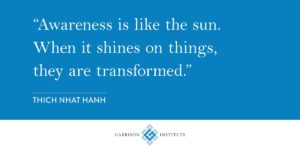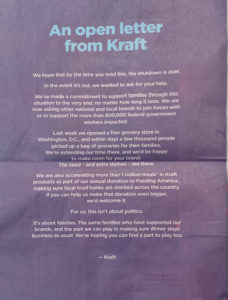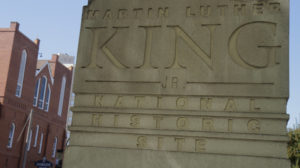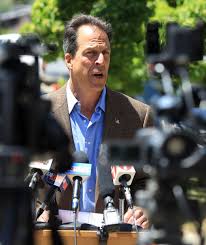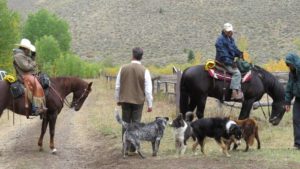✿
January 21, 2019“If I can help somebody.”
If I can help somebody, with a word or song
If I can help somebody, from doing wrong
No, my living shall not be in vain
No, my living shall not be in vain
If I can help somebody, as I’m singing the song
You know, my living shall not be in vain
AXIOS
As the elite descend on Davos, Switzerland, for this week’s World Economic Forum, two stark stats:
- Wealth held by the world’s billionaires has grown from $3.4 trillion in 2009, right after the meltdown, to $8.9 trillion in 2017. (UBS and PwC Billionaires Insights via Bloomberg)
- The 3.8 billion people who make up the world’s poorest half saw their wealth decline by 11% last year. (Oxfam, which works to alleviate poverty, via AP)
A new display of the Rev. Martin Luther King Jr.’s papers in Atlanta “provides insight into the slain civil rights leader’s thought processes as he drafted some of his most well-known speeches and notable sermons,” AP’s Kate Brumbach writes:
- “The Meaning of Hope: The Best of the Morehouse College Martin Luther King, Jr. Collection,” opened this weekend at the National Center for Civil and Human Rights in Atlanta, in the Voice to the Voiceless gallery.
- “There are drafts of his Nobel Peace Prize acceptance and ‘Beyond Vietnam’ speeches and of his eulogy for four girls who died when Ku Klux Klan members bombed a church in Birmingham, Alabama.”
“In drafts and outlines of speeches and sermons, both typed and written out longhand, words and entire lines are crossed out and rewritten.”
- “Even an already published copy of ‘Letter from Birmingham Jail’ is marked with further handwritten edits.”
- “Also included in the exhibition are King’s school transcripts — including one from Crozer Theological Seminary where he got a C in public speaking.”
Remembered as a great orator and a champion for human rights, Martin Luther King, Jr. also was a deep thinker on economics.
Between the lines: King’s philosophy has often been painted as a socialist because he advocated for the redistribution of wealth, referenced Karl Marx and even called for a “guaranteed annual income.” But King repudiated socialism and communism, noting in his 1967 speech “Where Do We Go From Here” that when it came to communism, “I have to reject that.”
“What I’m saying to you this morning is communism forgets that life is individual. Capitalism forgets that life is social. And the kingdom of brotherhood is found neither in the thesis of communism nor the antithesis of capitalism, but in a higher synthesis.”
Will CEO’s save society?
[Full page ad placed in the Washington Post over the weekend.]
~
The Delta Airlines Foundation provides a grant to open Atlanta’s Martin Luther King, Jr. National Historical Park for the MLK holiday since the government shutdown.
“Without the assistance provided by The Delta Air Lines Foundation, it would have remained closed during the Martin Luther King Jr. holiday weekend.”
The reopening comes as the civil rights leader’s family and fans celebrate what would have been King’s 90th birthday. And because of the grant, those celebrations and remembrances can now include visits to the home where King was born and his longtime church.
The 35-acre park, which draws more than 670,000 visitors to Atlanta’s Sweet Auburn neighborhood each year, reopened Saturday. With an $83,500 grant from Delta and money from National Park Service recreation fees, it now has enough funds to operate until Feb. 3.
The contributions are coming from businesses, groups and states. New York is paying to operate the Statue of Liberty National Monument, for instance, and Utah’s tourism office is paying to keep visitor services running at the Arches, Bryce Canyon, and Zion national parks. And in Yellowstone National Park, snowy roads are being groomed thanks to money from Xanterra Parks & Resorts.
~
Patagonia’s Action Works
For almost 40 years, Patagonia has supported grassroots activists working to find solutions to the environmental crisis. But in this time of unprecedented threats, it’s often hard to know the best way to get involved. That’s why we’re connecting individuals with our grantees, to take action on the most pressing issues facing the world today. We built Patagonia Action Works to connect committed individuals to organizations working on environmental issues in the same community. It’s now possible for anyone to discover and connect with environmental action groups and get involved with the work they do.
Learn more at: patagonia.com/actionworks
~
AXIOS |
There’s more pressure on CEOs than ever to address complicated issues facing society, and those that don’t embrace the opportunity could find themselves dealing with frustrated employees and customers.
Over three fourths (76%) of the respondents from the latest edition of Edelman’s annual Trust Barometer survey say CEOs should take the lead on change rather than waiting for government to impose it, up 11 points from last year.
Specific tactics can help CEOs rebuild trust, the study says:
|
The 2019 Edelman Trust Barometer reveals that trust has changed profoundly in the past year—people have shifted their trust to the relationships within their control, most notably their employers. Globally, 75 percent of people trust “my employer” to do what is right, significantly more than NGOs (57 percent), business (56 percent) and media (47 percent).
Despite the divergence in trust between the informed public and mass population the world is united on one front—all share an urgent desire for change. Only one in five feels that the system is working for them, with nearly half of the mass population believing that the system is failing them.
In conjunction with pessimism and worry, there is a growing move toward engagement and action. In 2019, engagement with the news surged by 22 points; 40 percent not only consume news once a week or more, but they also routinely amplify it. But people are encountering roadblocks in their quest for facts, with 73 percent worried about fake news being used as a weapon.
Public service and community growth.
As term ends, a commissioner considers legacy,
Larry Schoen looks back at a career in public life
by Mark Dee
Idaho Mountain Express
“I think elected office is immensely challenging. And I felt that, on a personal level, I needed that sort of challenge. I needed to try to live up to my ideals of public service.” Larry Schoen, former Blaine County commissioner
Schoen, who is 63, has had time to consider how a self-described private man transitioned to so public a life in Blaine County. And, he’s had time to consider his motto, which he attached to that career like a goal more than a decade ago: “To leave office with my integrity intact.”
He sat through plans for rampant growth, and saw them hollowed by the global belt-tightening of the Great Recession. He presided during natural disasters, fires and floods that wolfed up swaths of the Wood River Valley in quick and angry bites. He worked on wolves themselves, and other environmental fights that pitted interest against interest. There was Bowe Bergdahl, and the frenzy that swept through Hailey afterward. There were debates with Idaho Power, and Deer Creek and Camp Rainbow Gold—and thousands of other rulings, small to most everyone but the world to those involved, the discrete decisions that make up a career in politics that, at times, surprised Schoen himself.
“I’m a very private person,” he said. “You won’t find a Facebook page for me. You won’t find a lot of personal information out there. I hate having my picture taken, and I’m not very good at remembering people’s names. I’m not the sort of person you’d think of as primed for political life. But I think government service is important. I think elected office is immensely challenging. And I felt that, on a personal level, I needed that sort of challenge. I needed to try to live up to my ideals of public service. ‘To leave office with my integrity intact’—it all goes back to that.”
He turned 18 in 1973, a draft year at the ragged end of America’s involvement in Vietnam. It was a lottery—just luck that his number wasn’t called. Today, with the safety of decades between then and now, he wishes it was.
“I never did military service—I always regretted that,” he said. “I felt that at some point in my life, I needed to do some sort of serious public service. In a way, on a personal level, running for public office was my way of compensating.”
If his work as a reporter helped him explain policy, his life as a farmer helped shape it. He’s tried the three main modes of American living—urban, rural and suburban—and his view for the future of Blaine County is steeped in that experience.
“Hardly anybody has put as much effort into reading things, and parsing language,” said Len Harlig, a former county commissioner who remains a close observer of Blaine County politics. “He’s absolutely meticulous, going through materials to make sure they are correct, and accurate. He brought an efficiency to ordinances. His viewpoint was thorough, exhaustive and unaccepting of any comment not based in vigorous research. Even when you reached different conclusions, you never doubted the effort.”
His environmental record can match anyone’s in the county, according to Harlig, whether that meant advocating for conservation, or securing easements for open space and recreational access, or updating recycling and solid waste.
But Schoen describes himself as a progressive, and a pragmatist. Those combine to form a view of government that is closely tied to customer service, and much of his legacy—from internal communications, to organizational structure, to budgeting procedure—is, like the engine of any operation, hidden under the hood.
“As a county commissioner, Larry was a consummate professional,” said current board Chairman Jacob Greenberg. “His journalism background meant he was our go-to person to articulate policy.”
“Some of the most desirable and valuable communities in America have some of the strictest zoning—thought-out zoning codes that try to project the present and future values of those communities,” he said. “That’s especially true of small ski towns in Europe. And that’s why they still have their charm. We don’t want to lose our charm.”
Maintaining it was part of the Blaine County 2025 planning effort that Schoen participated in during the mid-2000s, as a member of P&Z. Back then, elected officials prepared for an unending boom. There was talk of two new towns—one by Gannett, another at Timmerman Junction. Projections envisioned the population swelling to 80,000 people in 20 years. Soon, Schoen thought, development pressure would burst out into the unincorporated county like champagne past a cork.
“I don’t know that they are all on the same page,” he said. “People acknowledge certain common values, like the need for affordable housing, the need to preserve our public lands and recreational access. The conversations really haven’t been had in a long time. Ketchum is doing its thing. Sun Valley does its thing. Hailey’s doing its thing. We need to work on a regional equation. If people are opposed to increased density in cities, but there’s development pressure, there’s only one place for it to go, and that’s out in the county. The question is, do we want to turn it into a suburbanized area? That’s a question for the community. The community needs to answer.”
Schoen’s personal answer is written across his land. He placed a conservation easement on the property curtailing its ability to be developed; those acres will never be subdivided.
“I would judge his view of county government as that of a purist,” he said. “He interpreted it as it was intended, and was fair in its application.”
Schoen: “When I talk to students, I tell them if you’re going to enter elected office, your main goal shouldn’t be to get re-elected. It should be to do what’s in the best interest of the community. To uphold the law. In a very dynamic, engaged county like ours, that will leave some people happy. Others won’t be. Eventually, that catches up with you.”
“There are roles I’ve been able to play because I was a county commissioner. I’m proud of the connections I’ve made, what I’ve been able to do. This job’s been immensely rewarding—for me personally, and, I hope, for our community.”
